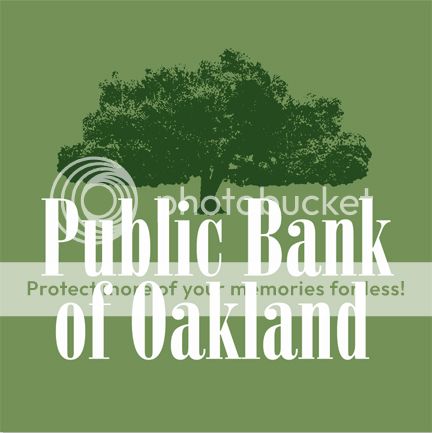A Public Bank for Oakland: An Idea Whose Time is Coming.
Councilpeople Dan Kalb, chair of the Oakland City Council's Finance Committee, and Abel Guillen, co-sponsored the event along with Kaplan.
The event was organized in part by the Friends of the Public Bank of Oakland, a volunteer activist organization which is gathering steam to insure the Oakland City Council takes a serious look at creating a public bank for Oakland.
Public banks are financial institutions owned by the people through their representative governments at city, county or state levels. Public banks differ from private banks in that they are mandated to serve the public interest. Unlike Wall Street banks that seek short-term profits for private shareholders by investing in stocks, derivatives and other speculative financial instruments, public banks primarily invest in their local economies: making loans to help small businesses, funding infrastructure, and improving the long-term health of their communities.
One important point discussed at the forum was that a public bank in Oakland may be able to serve Oakland's cannabis community where private banks either cannot or will not - partly because of onerous federal regulations and partly because of the possibility that a bank will be shut down over its dealings with an "illegal" industry. Much of the United States' cannabis economy is now conducted in cash - large bags of cash to be specific - and this is neither safe nor sane. Speaker Henry Wykowski, an attorney for Harborside, California's biggest medical marijuana dispensary, made clear how desperately the industry needs 21st century financial services, but how, as yet, it is unable to procure them.
A point of much interest to the public at the meeting was the fact that a public bank would allow Oakland and neighboring cities to remove its money from Wall Street banks - especially those who are currently funding the Dakota Access Pipeline. Jesse Arreguin, Mayor of Berkeley, lent political support from Oakland's neighbor to the north for the idea of divestment and such a regional cooperative arrangement.
Mark Armstrong, President of Commonomics, a non-profit advocacy organization for economic justictice, public banking, and in opposition to predatory capitalism, made a related point. With a public bank the community's values can be translated into the bank's loan portfolio, which can vary over time with the people's wishes. This in contrast to a private bank's loan portfolio, directed at maximizing profit with no thought for the community good.
Tom Sgouros, an expert in the theory of public banking and a former senior advisor to the Treasurer of Rhode Island, made the astute observation that instead of trying (and failing, for the most part) to "regulate away" the big banks' socially and financially destructive behavior, we should be looking at setting up financial institutions which have socially constructive behavior as part of their raison d' etre. This, he said, was a major reason he had taken to advocating for public banks.
Nichoe Lichen, a public banking activist from Santa Fe, rounded out the speakers, providing lessons from Sante Fe's ongoing attempt to create their own public bank.
Some forty minutes of Q&A followed the speakers, with good questions (and answers!) all around. You can watch the video of the entire Forum on Youtube.
Councilperson Kaplan summarized the event in a statement released on Friday, Feb 10th, 2017:
"...creating a bank that is accountable to the community is one of the ways we can put our money where our mouth is, fund needed projects, and invest in accordance with our values. We can protect our cannabis community by not forcing them to use cash transactions, and, like our recent successful efforts to create Community Choice Energy, we can harness local community support to take action that improves the environment, public health, and the local economy. As distrust in big corporate banks and lack of oversight at the Federal level are growing problems - this is how we can be part of the solution..."
The Oakland City Council Finance Committee is tentatively scheduled to hear a report from City staff on Public Banking on February 28th, at 9:30 AM in Oakland City Hall.
The Oakland City Council may take up the question of funding a rigorous feasibility study analyzing an Oakland public bank sometime in the next few months.
Get Involved
If you'd like to help with maintaining or developing the website, contact us.
Publish
Publish your stories and upcoming events on Indybay.



